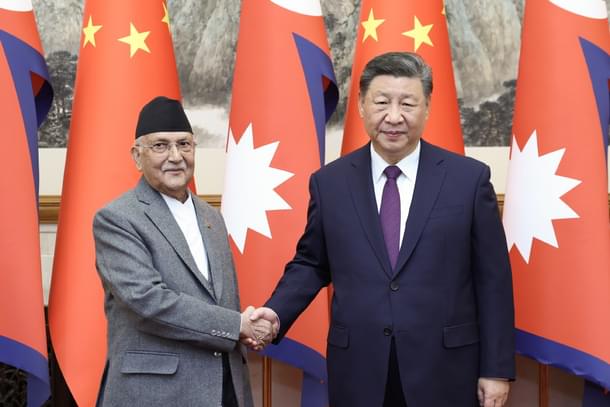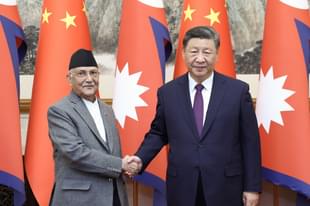World
Nepal Prime Minister Oli Wanted To Show Off His Chinese Connection To India, But Was Conned By Beijing
Jaideep Mazumdar
Dec 07, 2024, 04:52 PM | Updated Jan 22, 2025, 10:57 AM IST
Save & read from anywhere!
Bookmark stories for easy access on any device or the Swarajya app.


Pictures, as the adage goes, speak a thousand words. And the visuals of a meeting earlier this week between Chinese President Xi Jinping and Nepal’s Prime Minister Khadga Prasad Sharma Oli only reinforces the truth of this aphorism.
The Nepal Premier was on a four-day visit to China from Monday (December 2) with a wish-list. He desperately hoped that the Chinese leadership, whose wishes he had deferred to many times in the past, would oblige him and allow him to show-off his proximity to the powers-that-be in Beijing.
Oli wanted a lot of Chinese largesse: waiving off a US $216 million loan and Chinese grants, instead of loans, for BRI projects in Nepal. But Beijing refused to oblige and Oli was left sorely disappointed.
The nervous yet docile look on Oli’s face in a perfunctory handshake with a sour-faced Jinping when the two met on Tuesday (December 3) said it all. That the Jingping-Oli meeting took place at a state guesthouse in Beijing, and not at the ‘Great Hall of the People’ where the Chinese leadership usually meet world leaders, was in itself an indication of Beijing’s disappointment with its proxy, Oli.
China had, after all, expected Oli to sign on the dotted line and agree to the Beijing-dictated financing model for BRI projects. Under this model, China’s Exim Bank provides loans at rates significantly higher than that of international lending institutions like the World Bank, and the contracts for executing the projects must go to Chinese companies.
But Oli did not, or rather, could not, agree to China’s terms for financing BRI projects. He wanted 100 per cent financing from China for the BRI projects, but Beijing flatly refused. Agreeing to Nepal’s request would open the floodgates for similar requests from other countries who have, rather foolishly, signed up for BRI projects.
Why Oli tried to ward off China’s dictates this time
Oli, who is known for his craftiness, became the Prime Minister in July this year after forming an alliance with the Nepali Congress (NC) which was, till then, supporting the Communist Party of Nepal (Maoist) headed by Pushpa Kamal Dahal. The NC is the major partner in the present ruling alliance.
The NC had, at the time of forming the alliance with Oli’s Communist Party of Nepal (Unified Marxist-Leninist), or CPN-UML, made it very clear that it would not agree to Jinping’s flagship Belt & Road Initiative (BRI) projects in Nepal being financed by Chinese loans. China, the NC had laid down, should finance the projects as grants if it is keen on Nepal agreeing to BRI projects.
The NC insisted on this condition because it knew that Oli would be eager to please China and would agree to implement massive BRI projects with Chinese loans that would impose a huge debt burden on Nepal.
The NC leadership is well aware of the predatory nature of Chinese loans for infrastructure projects and the bitter experience of many countries which went under huge debts.
These countries were then arm-twisted into granting many concessions that impinged on their security and strategic interests and made them virtual colonies of China. The NC does not want Nepal to meet the same fate.
That’s why Oli, despite his eagerness to please China, could not do much. Before leaving for China, the NC leadership expressly forbade him from signing any BRI deal that would mean projects in Nepal being financed by Chinese loans.
Oli was told by the NC leadership that he would be welcome to get a good deal--Chinese financing of BRI projects as grants--from Beijing, but should not do anything that would increase Nepal’s debt burden.
But Beijing managed to con Oli
Nepal had signed up for the BRI in May 2017, but no projects under the initiative, which had been pushed aggressively by China, had been initiated in Nepal over the last seven years.
Beijing has been leaning hard on Kathmandu for the past few years to sign agreements to start work on mega infrastructure projects under the BRI framework.
Officials and political leaders of both the countries have been involved in protracted negotiations over BRI projects for Nepal. A task force comprising leaders of both the NC and CPN-UML was set up to finalise projects and modalities of financing for BRI projects.
The four-member task force rejected the Chinese proposal to finance BRI projects in Nepal through a hybrid model of 90 per cent loans and 10 per cent grants. The task force recommended that all BRI projects be financed only through unconditional grants.
The proposal prepared by the task force was sent to Beijing last week before Oli embarked on his visit to China. But the Chinese side sent it back, replacing the word ‘grants’ with ‘investments’. This confounded Nepal, whose officials and leaders found themselves unable to decipher the true import of ‘investments’.
After Oli landed in China, both sides engaged in intense deliberations and agreed to replace the word ‘investment’ with ‘aid and technical assistance’.
The two sides then signed a ‘BRI Cooperation Framework’. An MoU on building the Trans-Himalayan Multi-Dimensional Connectivity Network (THMDCN) was also signed by the two sides. The Chinese told their visitors that the agreements would “transform Nepal from a land-locked country to a land-linked country”.
China succeeded in convincing the Nepali delegation that the financing modality of BRI projects had been altered to Kathmandu’s satisfaction. Oli was told that ‘aid’ is just another term for ‘grants’.
It is learnt that Oli was made to believe that if the term ‘grants’ is used in the agreement, other countries would also demand Chinese grants for BRI projects in their countries. In order to preclude such demands, the term ‘aid’ would be appropriate.
But Oli was clearly taken for a ride. The Chinese go by the written word and if they do not commit themselves to something in writing, there are slim chances of their adhering to verbal assurances which, also, are kept deliberately vague.
“China had problems with the term ‘grant’ because it did not want to finance BRI projects in Nepal with its own money. Otherwise it would have agreed to the term ‘grants’. ‘Aid’ is a vague term, and deliberately so. It can mean both grants or loans, or a mix of both,” a senior NC leader told Swarajya over phone from Kathmandu.
NC leader and former foreign minister, Narayan Prakash Saud, said that if ‘aid’ means a combination of loans and grants, it will go against the NC’s stance on financing BRI projects in Nepal.
Senior NC leader Arjun Narasingha KC, who was part of Oli’s delegation to China, said that there is no clarity on what ‘aid’ means.
Another NC leader and former chairperson of the National Planning Commission, Govinda Raj Pokharel, said that Oli has been duped by the Chinese.
Incidentally, the Chinese refused to even discuss Oli’s request to waive off a US $216 million loan that was given by Beijing for the construction of the Pokhara international airport. The airport has become a white elephant and Nepal is finding it impossible to pay even a part of the interest on the huge loan.
Why Oli went to China instead of coming to India first
Oli, who became the Prime Minister of Nepal for the fourth time on July 15 this year, had broken a long-standing tradition of Nepal’s Premiers making India the first port of call after assuming office and visited China instead earlier this week.
Oli had visited New York late September, but that was to attend the 79th UN General Assembly. He had met Prime Minister Modi at the sidelines of the UNGA.
But Oli, who has always displayed a streak of defiance as far as India is concerned, chose to make China the destination of his first official overseas visit.
Soon after assuming office, Oli’s officer conveyed to New Delhi that the new Prime Minister would like to reach a deal on the disputed Kalapan-Limpiyadhura-Lipulekh area (read this). The ‘deal’ that Oli proposed was that India hands over this portion of Indian territory to Nepal.
Oli also wanted a number of trade concessions, and Indian approval for use of Indian airspace for flights to and from the new Pokhara international airport that has been built by the Chinese.
Oli contended that only if New Delhi agreed to all this would his visit to India be fruitful. Oli’s office told India that he (Oli) is not interested in just a ceremonial visit that would yield nothing for Nepal.
“Oli conveyed to us that he would be willing to follow tradition and make India the destination of his first official foreign tour, but India would have to give him something that would help him show that the visit is beneficial for Nepal. Otherwise, a ceremonial visit would only convey the impression that Nepal is subservient to India,” a senior officer in India’s Ministry of External Affairs (MEA) told Swarajya.
India, expectedly, said there was no question of handing over any slice of Indian territory to Nepal, or grant commercial aircraft destined for or flying out of Pokhara use of Indian airspace. India, Oli was told, had made it clear to Nepal a few years ago that it will not grant any concessions or favours to Nepal in order to ensure the viability of projects implemented by China in that country.
Oli publicly stated that he had requested New Delhi for convenient dates for visiting India, but was kept waiting. And that is why he finalised the trip to China instead of waiting indefinitely for word from New Delhi.
By going to China first, Oli wanted to demonstrate to India that China is more accommodative of Nepal’s interests and requests. Turns out he was wrong and has been duped by China.





